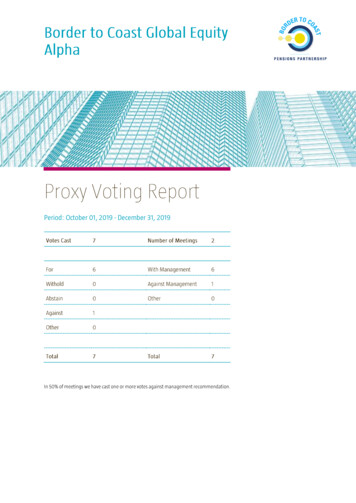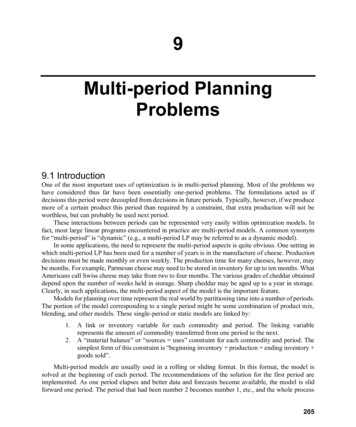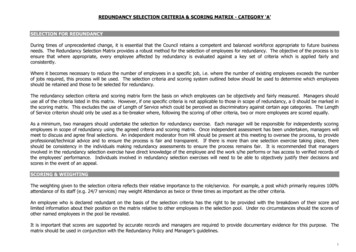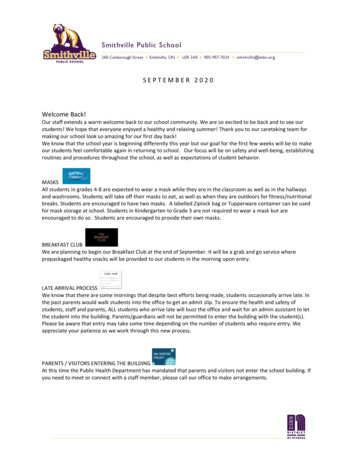
Transcription
Period: October 01, 2019 - December 31, 2019
The risks associated with the energy transition and physical impacts of climate change have put the energy sector undergreater scrutiny in recent years. As a result, oil majors and utilities companies have increasingly been targeted byshareholder activism calling upon them to properly address environmental issues linked to their operations. Thisactivism most commonly takes the form of shareholder proposals submitted for a company’s annual general meeting.Growing concerns around the impact of climate change have also led to a shift in investors’ voting approaches. Forinstance, increased collaboration amongst investors has led to a convergence of requests put forth to their issuers,starting from climate risks disclosure, to emission reduction targets, climate stress testing and climate risk governance.Similarly, the recommendations of the Task Force of Climate-related Financial Disclosures published in 2017 havebecome a reference point for engagement on climate issues and more broadly on ESG issues.The increased pressure from investors using voting rights has also contributed to companies anticipating shareholders’concerns and addressing them through different channels outside proxy statements, which has coincided with a rise inthe direct engagement between investors and companies. This increasing level of companies’ responsiveness hasconcurrently contributed to a decline in the overall level of shareholders proposals submitted. For example, the mostrecent proxy season in the US saw the lowest number of shareholder proposal submissions in the last five years, froma high of 549 in 2015 to 420 in 2019.This trend is in part explained by the varying means for companies to address shareholder concerns. In 2018 US proxyseason, 48% of filed environmental proposals were withdrawn, while only 37% of filed proposals went to a vote.Historically, these figures were reversed, as a greater proportion of proposal would go to a vote compared to proposalsthat were withdrawn. However, given that engagement between institutional shareholders and companies hasincreased, it is likely that the decline in proposals filings could be related to discussions and engagement outside of theproxy process.In the end, environmental issues are increasingly scrutinized by shareholders and corresponding shareholderresolutions can expect a growing level of support, as investors encourage more companies to improve disclosures andpractices on such issues.
On November 5th 2019 the Securities Exchange Commission (SEC) proposed a set of changes to several rules related tofiling shareholder resolutions and the service offered by proxy voting advisors. We believe that the changes proposedcan severely hinder shareholders’ rights and do not represent the long-term interest of minority shareholders.Shareholder resolutions serve as a useful tool to inform corporate management and boards of shareholder prioritiesand concerns. This has been a strong mechanism in the United States, creating accountability with management andfacilitating engagement dialogue between investors and companies in the last decade, whilst enabling the achievementof considerable changes in corporate conduct. We recognize that shareholder proposals vary in their quality and merit,however have a strong preference that the judgement on these issues is left with the owners of the company, asopposed to making the filing process more difficult.One of the amendments proposed by the SEC involves increasing the resubmission thresholds for shareholderresolutions from 3% to 5% in the first year of resubmission, 6%-15% in the second year, and 10%-25% in the third. Thiswould put under strain novel topics that did not yet gain large traction among investors, but tackle emerging issuesthat might impact the business over the long-run and therefore are relevant for both the company and its shareholders.Another proposed rule change involves restricting the amount of shares that can be aggregated to meet the applicableminimum ownership threshold to submit a shareholder proposals. Shareholders that file resolutions together withother investors are more likely to have tested the merits and implications of a resolution more carefully.For many investors the use of proxy advisors is a practical starting point for their analysis when exercising their votingrights. The suggested regulatory change requiring proxy advisors to share draft reports with issuers before these areavailable to investors is adverse to the interests of shareholders. This can jeopardize the objective advice of proxy votingadvisors, given that companies are entitled to comment on the final vote recommendation. We believe that anindependent third party or an appeals system is likely to have more merit related to the SEC’s goal of enhancing thequality of interpretation.Moreover shareholder meetings take place during a concentrated period in the year. Shortening the timeframesbetween the publication of voting advice and the shareholder meeting taking place will therefore reduce the time thatshareholders spend analyzing the agenda and consulting with other relevant stakeholders prior to casting their votes.This means they are more likely to simply vote in line with proxy advisors. Therefore we believe that the regulation willhave the opposite effect of its intended effect.
Issuer NameMeetingDateFactset ResearchSystems Inc.12/19/2019 Advisory Vote on ExecutiveCompensationProposal DescriptionManagementVoteRecommendation DecisionForAgainstWith Or AgainstManagementVote NoteMeetingTypeAgainst ManagementLong term awards are not linked toAnnualperformance.
starting from climate risks disclosure, to emission reduction targets, climate stress testing and climate risk governance. Similarly, the recommendations of the Task Force of Climate-related Financial Disclosures published in 2017 have become a reference point for engagement on climate issues and more broadly on ESG issues.











